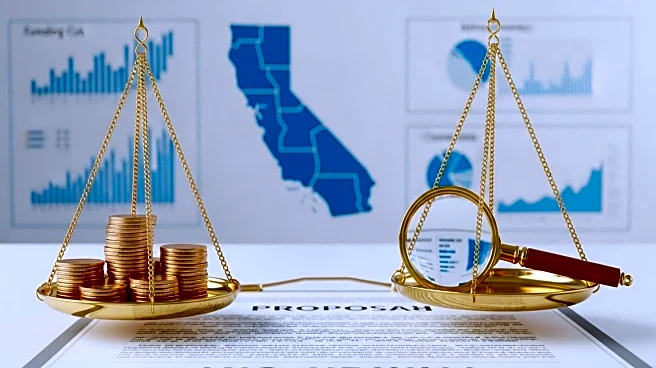What is the story about?
What's Happening?
The Trump administration, through Russell Vought, director of the White House's Office of Management and Budget, announced plans to cut funding for energy projects in 16 Democratic states, including California. This decision involves an $8 billion reduction for climate projects, notably affecting California's hydrogen hub. In response, a letter to the editor suggests that California, which contributes approximately $83 billion more in taxes than it receives in federal funding, should consider withholding federal income taxes for state employees and redirecting these funds to the state treasury. This proposal aims to leverage California's financial contributions to counteract the federal funding cuts, potentially causing a cash crunch for the federal government.
Why It's Important?
The proposed funding cuts by the Trump administration could significantly impact California's climate initiatives and energy projects, which are crucial for the state's environmental goals. The suggestion to withhold federal taxes highlights the ongoing tension between California and the federal government, particularly under President Trump's leadership. If implemented, this tax retention strategy could set a precedent for other states facing similar funding cuts, potentially altering the financial dynamics between state and federal governments. The broader implications could affect public policy, state-federal relations, and the financial stability of federal programs reliant on state contributions.
What's Next?
If California decides to pursue the tax retention strategy, it could lead to legal challenges and negotiations between state and federal authorities. The move might prompt other states to consider similar actions, especially those affected by the funding cuts. Political leaders and civil society groups may engage in debates over the legality and ethical implications of withholding federal taxes. The situation could escalate into a significant political confrontation, influencing future federal funding policies and state autonomy in financial matters.
Beyond the Headlines
The proposal to redirect federal taxes to the state treasury raises ethical and legal questions about state rights and federal obligations. It underscores the complex relationship between state and federal governments, particularly in politically divided contexts. Long-term, this development could influence discussions on state sovereignty, fiscal independence, and the balance of power in the U.S. federal system. The situation also reflects broader cultural and political divides, as states navigate their roles in national governance under varying administrations.
















